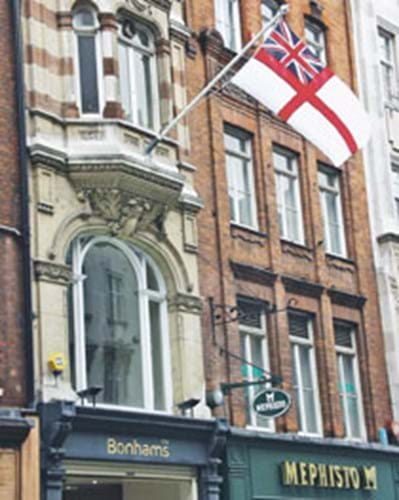
In a deft sleight of hand, the chairman of Bonhams managed to salute the entente cordiale on one side of the Channel as he opened the company's new Paris office, while raising the White Ensign over his Bond Street rooms as a bicentenary Trafalgar tribute to that hammer of Napoleon, Admiral Lord Nelson.
All of this has taken place against the backdrop of Bonhams' buyout of French billionaire Bernard Arnault's all-but-half share in the firm through LVMH. It leaves Robert Brooks free to take the company forward without being shadowed. He describes the deal more as a psychological step forward than a material change, as LVMH have always been more of a sleeping partner. "I am extremely grateful to LVMH, they have always been very supportive. In fact, I can't think of a single thing we have asked to do that they have said no to."
The point is, he no longer has to ask.
He won't discuss the details of how the buyout was financed, other than to say that, after three years in profit they were in a position to negotiate. But any injection from backers would not have been forthcoming if they were not confident in the future of the business.
So what is that future and has Robert Brooks' view of it changed now that LVMH are out of the picture?
Clearly not.
In previous ATG interviews his vision has been consistent and clear: it's not about reinventing the wheel, it's about building a traditional auction business in a modern setting; the cornerstones are the development of client services and a better platform from which to sell.
Technology plays its part, but the other major development of that 'platform' is the global expansion of Bonhams' network of salerooms and offices. The latest addition, Paris aside, is the takeover of yet another small but well-established auction business to add to their Australian portfolio. They are also negotiating consignments in China.
One has to remember that there is still a sizeable difference between Bonhams and rivals Sotheby's and Christie's, who continue to dominate the market, and Brooks seems to be playing the long game. But while the recent expansion of Bonhams' New York operation has been fairly low-profile - "We are not trying to conquer the world at square one, but build the business in the existing market" - he describes the imminent New York sales as "key".
Building the firm's East Coast presence will undoubtedly draw on the standing of Bonhams' West Coast dominance through Bonhams and Butterfields, run by chief executive Malcolm Barber. Brooks goes on the record to say that Butterfields have just achieved the
highest sales total in their history and Bonhams globally enjoy healthy profits.
It's a different tale from when his old firm, Brooks, acquired first Bonhams, then Phillips - "it was losing buckets" - in 2001, and then Butterfields - "losing almost as much" - in a deal with eBay in 2003. The resulting operation may have developed into a bigger global brand, but the philosophy remains unchanged. "What sets us apart is that we remain a company run by auctioneers."
Quite what his rivals at Sotheby's and Christie's will make of that statement is not clear, but he is crystal clear on some of their policies.
On Sotheby's decision to outsource some expertise: "What's good for Sotheby's may not be good for us. Bonhams prides itself on being able to offer the seller the complete service across the board. To me it means we have to have control of our specialists and consistency in the way they do business."
Brooks also declares himself "surprised" by what he believes is Christie's ambition to cut out the dealer and sell direct. "The trade play a critical role in the market. They are the oil that lubricates the market by offering a critically different service. Without the trade we would be in danger of the market reacting violently to every small shift."
So, do his ambitions run to taking over Sotheby's or Christie's? - There is talk that both are effectively on the market. There have been several periods of major change in the industry, he says. "Maybe we are entering a new period now... All I do know is that Bonhams isn't for sale."
And what of the industry as a whole?
Consumer confidence may be down in the UK, but this does not seem to be hitting sales, says Brooks. But he sees Droit de Suite, the new levy on art sales to benefit artists, due to be introduced early next year in the UK, as a potential nightmare for the domestic market. He also fears the potential in next year's relaxing of pension rules to allow investment in art "may have been overplayed".
But, his biggest concern is that if the industry does not do more to regulate itself, legislation will intervene. Again, it's his rivals he has in his sights. He wants them to follow Bonhams' example and introduce separate client accounts for vendors' funds across all of their rooms.
"I find it absolutely bizarre that Christie's and Sotheby's don't. I think it's very dangerous and unethical and it really does need to come to a head."
Robert Brooks may have put up the White Ensign on Bond Street, but don't mistake it for the white flag.




